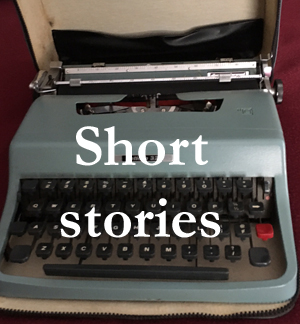His first reaction, he told Betsy that evening, was anger; he’d felt choked by the hot blood at his collar. “I’ve worked 42 years at that newspaper, and the damned company doesn’t even have the decency to talk to me man-to-man. Put a letter in my mailbox while I’m out to get some lunch, for God’s sake!”
“Dear Harry,” the letter he brought her began – a letter easily recognized as pseudo-personalized by a computer – “You are eligible for an unusual opportunity. . .”
Ordinarily, Harry was imperturbable, phlegmatic, a man who handled  deadline crises without even seeming hurried. “I’m a newsman,” he told a young colleague who marveled at his unflappability on one occasion. “You gotta like the heat in the kitchen.”
deadline crises without even seeming hurried. “I’m a newsman,” he told a young colleague who marveled at his unflappability on one occasion. “You gotta like the heat in the kitchen.”
He looked the part: big-boned, a bit overweight despite working out five days a week – just a bit, not quite a paunch. He could put on a suit just back from dry-cleaning and look rumpled five minutes later. His hair, decidedly graying, seemed perpetually to need a comb. He’d worn glasses since his teen years; they were thicker now, with half-moons at the lower edge of the lenses.
His uncharacteristic anger, he told Betsy, dissolved almost immediately into foreboding. “I’m 64 years old. Planned to stay at the paper to 70, save money for a decent retirement. Who in hell is hiring people my age? Everybody’s downsizing!”
He didn’t tell her that his hands shook, there in the office, as he re-read the letter. They had financial obligations: Willie – no, Will now – back in college for an advanced degree, Marcie and her husband maybe needing help with grandkids’ education. And not much by way of savings. They’d moved to a more modern house a decade ago; there was a mortgage. They prudently had enough term life insurance to see Will through, and to pay off the mortgage if something happened to either of them; but apart from planning against such a catastrophe, he’d never imagined a day when he might be unable to provide.
Nor did he tell his wife of the vivid image that had popped unbidden into his mind, of a crumpled automobile at the bottom of a ravine. Years ago, he’d been on the police beat – the cop shop, they called it, one of his stops as he traversed most of the beats a metropolitan newspaper offered. There was a fatal one-car accident: A man had gone off a steep cliff.
“Could have been a suicide,” the sergeant had told him. “There’s no way to tell. Didn’t have his seat belt fastened. Or maybe just distracted by something. Can’t tell.”
Can’t tell? Harry remembered asking.
“A lot of suicides are obvious,” the cop had said. “But insurance policies don’t pay off on suicide: Put a gun to your head and kiss the insurance money goodbye. A death like this goes down as an accident; there’s no way to prove otherwise. If this guy meant it, though, it’s a hard way to go. You could end up crippled for life instead of dead. Messy.”
Although that cliff was on the road he traveled every day from the newspaper over Ragged Mountain to their suburban home, he’d almost forgotten the incident. It came back now in granular detail.
Getting through the rest of the day at the paper had been hard. His mind kept wandering back to the letter, and then he’d have to begin again whatever he’d been doing. He wanted to talk with his boss – Charlie had always been supportive – but wasn’t sure he could keep his composure and thought it wiser to talk with Betsy first. He also thought of just going for a walk, but wasn’t sure that he’d come back to finish the next day’s pages. So he forced himself step-by-step through the routine until it was done.
Driving home, cresting the mountain, he glanced at that ravine. For anyone who wanted to stop and gawk at the view back to the city, there was an extra-wide shoulder parking area. At the edge was a stout wooden post-and-beam railing that hadn’t been there years ago. He paused at the shoulder for a moment, trying to recall some more recent stop here. He was sure he’d tarried up here, but it wouldn’t come. After a time he eased back onto the road and drove home.
***
Betsy, sensing his mood, curled up against him on the couch so she wouldn’t seem to be reading his face. “What are they offering?”
“Oh, they probably think it’s generous. A year’s salary, health coverage for another year, and an extra two years toward my pension. That doesn’t cost them a damned thing; it comes out of the pension fund, which the government protects, and the company’s bankers have invested well.
“But even with that extra,” he added, “we can’t afford to start drawing down that pension yet. I’ll have to look for a job.”
There was a time when he’d have set out with cocksure confidence. He’d been a good reporter, his byline known all over the city. He’d done general assignment, the cop shop, and features, and had worked his way up to cover City Hall and then state politics. There’d been some journalistic prizes to hang on the wall. He had a reputation for accuracy and fairness; not everyone in the news business did. A lot of important people felt he’d done them a favor by not hyping a story. He’d been a good writer, good with a catchy lead paragraph, but not a sensationalist.
He’d been on a first-name basis with a hundred or more movers and shakers in this town. Back in the day, he could have telephoned any of them to look for a job. In fact, years back, some had sniffed around to see if he’d take a PR job, or even a senior advisory position. He’d had more than one solid offer, but he’d stayed with the paper, with the craft he knew best.
Then, as an editor, he’d become a faceless technocrat; he no longer had much direct contact with news sources. “If I were still out on the front lines, I’d have a better chance,” he told her. “But I’m not, and I don’t.” She turned her face up to him, and he managed a lips-closed smile.
“Is nobody hiring?” she asked.
“Damned few. I read the other day that the number of working journalists in the nation is half what it was 20 years ago.”
He was a good editor. He’d begun back when news stories were hammered out on a manual typewriter – later, an electric – and editors marked up copy with a thick #4 pencil, hollered for a copy boy, and sent the story upstairs. There, in his first years, it was set into type by men and women at Linotype machines, half of whom were deaf because that was an advantage in a racket-noisy composing room. He still kept an engineer’s protective plastic insert in his shirt pocket. It was part of his persona, even though nowadays he rarely used a pen or pencil. It was all keystrokes now.
He’d managed the transition to computers easily; had one at home before the company went digital. Editing copy was neater and easier: Mark a few words for deletion, type in better words, write a headline, send it back with a keystroke to the reporter for review, maybe argue a bit over nuances of language, then send it upstairs to be set into type – not by deaf fingers, but by a robot.
There was nothing robotic about the editing. You had to know the news and the names, recognize an error, call the reporter to get more details or clarify a point. The newspaper’s dwindling institutional memory would die a little more when he left. They couldn’t replace his sense of history, his knowledge of who did what a dozen or three dozen years ago, and how that affected today. “They don’t care,” he told Betsy. “Only about the bottom line.”
The company surely couldn’t complain about his adaptability. In the last few years, he’d learned pagination, assembling multiple stories and creating a whole page on the computer. There had been layoffs and reductions-in-force by attrition upstairs, as people like him replaced first the Linotype operators, and later the men and women who pasted “cold type” into pages to be photographed into printing plates.
He’d known them all, even the deaf-mutes. Handicapped? Hell, no: perfectly suited to the din and clatter of that day’s composing room. They could communicate easily without shouting; he’d learned some sign language. He’d also learned to keep his hands off the lead bars of type, which the union insisted could be handled only by its members.
The hushed quiet of the composing room today might be a sign of progress, but at a human cost. He’d attended retirement parties for those back-shop men and women as the union relented, letting the company modernize but winning decent early-retirement packages for its people. He saw some of them occasionally, working at the post office or driving people to work when he dropped off his car for service. It made him sick, seeing people make no use of a lifetime’s expertise, earning a fraction of what they’d been worth as skilled craftsmen. He’d felt for them; but he’d taken comfort in the assurance that he was not so easily replaced.
Now it turned out he’d been wrong about that.
Until today, there’d been a comfortable rhythm to his life. He got up early and went to the basement for a half-hour on the rowing machine while he watched the morning TV news. That was mostly a repeat of the 11 p.m. news, after he’d gone to bed; he watched to see if there had been a late-breaking story or something the paper had missed. He was in the office by 8:00, read the morning paper carefully before the phone started to ring, and often called reporters still at home to suggest a new angle to explore. He worked until late in the afternoon.
Fridays were especially long, preparing pages for Saturday and Sunday and Monday, usually keeping him until a late dinner. He was good at suggesting stories a reporter could write Friday morning that still sounded fresh on Monday. He no longer earned overtime; he was an executive, part of “a prized management team”, they told him at an annual dinner. He and Betsy had come home from all those events feeling more secure, bearing a fresh plaque or memento of the company’s confidence in him.
Hard to square with today’s letter.
Family life had suffered, but Betsy was understanding and filled in capably. She was a schoolteacher, so her day began not long after his. At times she’d made breakfast for the children but left before their school bus arrived. He’d tried to do his share: visiting with teachers at open houses, taking Willie to Little League and Marcie to track meets, even serving a few years as Scoutmaster when the troop and the boys needed him.
She read the letter again. “Do you have to take the buyout? It’s an offer, right?”
No, he didn’t have to take it, but the handwriting was on the wall. “They don’t want me anymore. If I don’t take this, they’re just as likely to lay me off a year from now, without the sweetener. I’d just sit around waiting for the axe to drop. I don’t even want to think about it.”
The paper had been independent when he started. Then a chain bought it. Now the chain had been swallowed up by a bigger chain. The new owner wanted to combine print journalism with television; it owned one of the stations in town. There was already a vest-pocket TV studio in a corner of the newsroom. There, reporters and editors stared into a robot camera, pretending to be face-to-face with an evening news anchor in a studio halfway across town, describing the stories to be printed next day.
He didn’t know a damned thing about television. Over the years the TV stories had grown shorter and less informative, yielding to viewers’ short attention spans – or more likely, he thought, fostering that taste for brevity. He couldn’t remember a television story that had satisfied him; he was always left hungering to read the newspaper’s account.
And he wasn’t telegenic: the glasses, graying hair, sagging midriff, rumpled look. The boob-tube audience wanted young people, sex symbols, or else the rare man whose trim figure defied age, whose angular jaw and carefully coiffed gray hair suggested avuncular wisdom. He’d occasionally joined a Sunday morning panel on public television, where an un-suave appearance was a badge of expertise, but even in that relaxed setting he spoke hesitantly. His voice was too high-pitched, conveying insufficient macho.
He had a month to decide. Time to look around, to see if there was, somewhere, an insurance company or bank or industrial corporation looking for an experienced man who had been on the receiving end of PR, so would know how to spin a story, put the best face on the company’s latest move.
He’d had friends go into public relations. They made more money, and had better hours, but he’d felt a bit sorry for them, settling for a life removed from the real work of news. Ironically, some of them had recently been downsized, too.
It wasn’t a good time to go looking for PR jobs, either.
And he’d have to submit to a physical. He felt in good health, but his cholesterol was high, and he carried those extra pounds. He had an enlarged prostate, although no sign of cancer. He found himself thinking of reasons a company might find to avoid hiring him.
It wasn’t a good time for to look for any kind of work.
“Make up a list,” his schoolteacher wife advised, as though she were giving him a homework assignment. “Write down all the people you’ve helped over the years. A lot of them remember you.”
Good advice; sensible Betsy. He went up to the computer after supper. His Rolodex was years out of date; not being on the street, he hadn’t kept it up or put it on the computer. He had to use the phone book and the yellow pages, but he put together a list of people who might remember him, names and addresses. He printed it out and showed it to Betsy, who thought of a few he’d forgotten. “Don’t hurry it,” she said. “A few more will pop into your head. There’s time.”
He tinkered at a letter: “Dear XX. It’s been several years since we worked together. Now I need your help. Downsizing at the newspaper has reached me. . . .”
He tried the first paragraphs three times, comparing the words on the white screen. How to phrase it, put the best face on it? Plead for a job? Or try to brag about a supposed opportunity to snag a skilled veteran? He saved all his draft versions and set the task aside.
Talking to the kids always cheered him up, feeling their youth and vitality. He got Betsy on an extension, and phoned each of them, not mentioning the buyout business, just chewing the fat. Will had a term paper that wasn’t going well. “Keep at it, son,” he advised. “Keep plugging. The words will come. You’ve got enormous potential, guy.”
The words stuck in his throat: too much like advice to himself, but at his age he didn’t have Will’s potential anymore. He managed to voice a cheering chuckle for Will, but had to end the conversation and hang up before he lost it. He took off his glasses to wipe his eyes, glad that Betsy was down in the kitchen.
She came upstairs, bringing him a glass of Scotch that he usually denied himself on weeknights. “Relax, honey,” she said. “You don’t need to solve it all tonight. Come to bed.”
He was too upset to think about romance, and he couldn’t face trying to sleep. “You go ahead, honey. I’ll just poke around at this a little longer.”
She made a face. “Don’t be too late.”
***
Where was that insurance policy? He thumbed through the file drawer and found it. Yes, enough to get the Will through his Ph.D, let Betsy pay off the house, and some left over. Maybe he could buy a little more coverage. No, that would arouse suspicion. Act now, before his resolve weakened.
The shot glass was still half-full. He set it on the counter, went to listen at the bedroom door for Betsy’s steady breathing, glad that she was such a sound sleeper, then eased down the stairs. He turned off the chime on the alarm system – a quick beep – so she wouldn’t hear him leave the house.
He hadn’t put the car away, so didn’t need to open the noisy garage door; he eased into the car and backed out. Two blocks, then onto the highway, and up the mountain to the spot from cop-shop days. The precipice was on the homebound side, but there was no traffic, so he veered across lanes to park and get out of the car. Just scoping it out. Looking straight out, the downtown lights were off to the right.
The ravine was deeper than he’d remembered, steep-sided, huge boulders at the bottom. The highway department had put up that timber rail, but maybe hadn’t brought enough material because there was a gap midway. He paced it: comfortably wider than a car, but one would have to steer carefully for the opening while keeping the foot on the throttle.
He hurried back to the car; didn’t want a cop on routine patrol to remember his being parked here, let alone stop to ask what he was up to. He started to fasten the seat belt, thought better of it, and eased back onto the inbound lane and down the hill toward the city.
Traffic was so light enough at this hour that he could have done a U-turn at the foot of the hill, but it would be just his luck to have a cop come into view. He drove farther until he saw a housing development he could turn into and then come around the block to start back.
He tried to concentrate on the road, not think about Betsy and the kids. The thoughts came anyway: Sweet Betsy, who would half-waken if he came to bed and murmur encouragement as she fell back to sleep. Will, back at college, and Marcie and the grandkids.
No, put them out of his mind. This was for them. Halfway up; he nudged the speed up, clenching the steering wheel with both hands, steadying not the wheel but the hands.
And then it came back, the more recent time he’d parked on top of this hill. Years ago, with a frighteningly despondent Will, whose fourth and final Ivy League application had just been turned down.
“Son,” he’d said, “state college isn’t a disaster. Do well there, and you may be able to transfer up. This won’t be the last time life gives you a kick in the ass instead of a boost. The measure of a man isn’t how lucky he is; it’s how he overcomes bad luck.” Turned out to be good advice: Will had buckled down at State, ended up at Harvard, and now was back for advanced study.
And good advice for himself, too. He reached the crest, the panoramic view of city lights off to the right, almost behind him . . . and held to the road.
He felt the sweat in his armpits as the tension drained away; he was limp as a dishrag, and almost that wet. He felt relief as he turned into the driveway. He left the car outside again and tiptoed into the house.
Past one, but not ready for sleep yet. He found the Scotch, went to the den to turn on a tiny desk light and then the computer. He had a resumé somewhere, begun years ago; he searched. There it was; seemed ancient. Must be from the last time someone offered him a job: It described a younger man, one he had difficulty remembering. There had been promotions since then, added responsibilities, a few prizes.
He began brushing it up. It felt good, at first, recalling good times. Then it hit him again how unlikely this was to do any good.
He shut down the computer, turned off the light, and stood.
-End-
Published by Portrait of New England, July 2023





